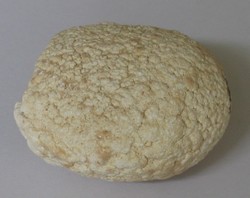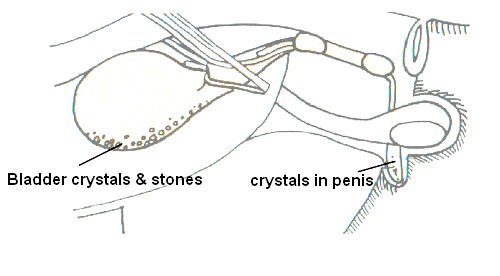BACKGROUND INFORMATION CRYSTALS/STONES FOR YOUR DOG, CAT AND GUINEA PIG.
 |
Urolithiasis is frequently diagnosed in dogs, cats, guinea pigs and other pets. Symptoms are:
- blood in the urine
- frequent urination
- pain whilst urinating
- straining to urinate
- incontinence
- abnormal colour of the urine
- behavioural change such as: restlessness, lethargy, hiding, loss of appetite, urination in unusual places
The most frequently occurring bladder stones and crystals are struvite crystals and stones. Less common are:
- ammonium urate
- calcium carbonate
- calcium phosphate
- calcium oxalate
- cystine
Bladder stones and crystals can be caused by saturation of the bladder with minerals. An excess of minerals in the urine will cause the mineral crystals to form, and gradually become larger. Mineral crystals frequently adhere themselves to organic material in the urine, as a result of which certain structures arise, which will develop into crystals which can eventually grow into stones.
 |
Bladder stones and crystals can cause several types of complaints, depending on the size, place and formation of the stone. Their sharp edges can damage the mucous membrane of the bladder wall, with cystitis as a result. Also, stones can block the flow of urine from the bladder to the urethra. When the urethra is blocked by stones, the flow of urine can be blocked. In that case your pet can no longer urinate causing the bladder to fill up. Because the urine is no longer removed, the kidneys can no longer eliminate poisonous waste from the body, resulting in an accumulation of waste products in the body. This causes weakness, loss of appetite, your pet can vomit and there is general discomfort. It is important to visit your vet immediately.
A vet can present the following treatment (extracorporeal shock wave lithotripsy is not used):
- dietary food
- surgery (opening the bladder and removing the stones)
- penis amputation
- catheterisation
 |




